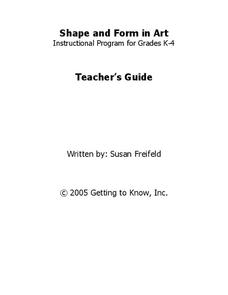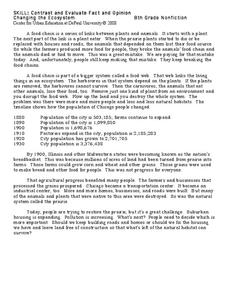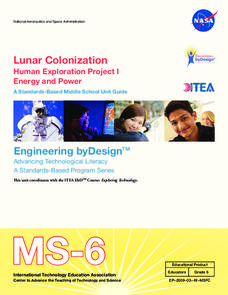Getting to Know
Shape and Form in Art
Introduce youngsters to the important role shape and form play in art with this extensive collection of activities and projects. From teaching first graders how to create mandalas to engaging third and fourth graders in the design...
NASA
Raisin Bread Universe
What is the universal breakfast? The resource includes two activities, the first one observing oatmeal to understand the texture of the universe. Then, scholars measure raisin bread dough before and after it rises to represent the...
Curated OER
The Holy Land
Explore the culture, geography, and religion of Ethiopia. Learners complete a viewing guide while watching a film on Ethiopia as the first Christian country in Africa. Additionally, they create group presentations and write paragraphs...
Curated OER
The Indian Subcontinent Since 1947: The Legacy of Independence
An exploration of Indian and Pakistani cultures and conflicts throughout the 20th - 21st centuries, this presentation features relevant political cartoons and poignant photos to illustrate the breadth of politics in India and Pakistan....
NASA
Let's Investigate Mars
Take your science class on a hypothetical field trip to Mars with an engaging astronomy lesson. After first learning about NASA's Mars rover missions, young scientists plan their own scientific investigations of Earth's...
National Endowment for the Humanities
Soviet Espionage in America
The war against Communism and Joseph McCarthy’s place in it are the focus of a series of three lessons examining postwar America from 1945-1950. This first instructional activity asks groups to read an introduction that describes the...
Curated OER
Feelin' Buggy
Students discuss five senses, compare and contrast human and insect senses, use adjectives to describe things they touch, smell, and see, and write stories in first person describing what it would be like to be size of insect.
University of Arkansas
Human Rights
What basic rights are guaranteed to all Americans? Do citizens, legal aliens, illegal aliens, and minors all have the same rights? Should individuals all over the world enjoy the same rights? Class members read the Declaration of...
Nemours KidsHealth
Car and Bus Safety: Grades K-2
Nearly every child will ride in a car or take a bus during their elementary career, that's why it is so important to teach them safety skills. First, little ones discuss why safety rules are important. Then, they go over rules that will...
Curated OER
Cartoons for the Classroom: Satire or Slander
Encourage your young learners to analyze and think critically about how media portrays people or events. Upper graders analyze a political cartoon depicting President Obama as a Muslim and the First Lady as a revolutionary. Guided by...
Curated OER
Acting for the Common Goods
The first of a three-part series on bullying, this plan has class members present skits about bullying, write and sign an anti-bullying pledge, and complete a service project. For the skit, learners use information from previous lessons...
Alabama Learning Exchange
Float or Sink?
Experiment with mass and density as scholars figure out what makes things float or sink. First, they watch a podcast introducing these concepts. Be sure to use the comprehension question to test their understanding. Young scientists...
Polk Bros Foundation
Harold Washington's Acceptance Speech - April 12th, 1983
Harold Washington forged a coalition of voters and won the Chicago mayoral election of 1983. In doing so he became the first black mayor of that racially and ethnically divided city. Excerpts from his speech are included in a worksheet...
Hyperion Publishing
Words We Live By: Your Annotated Guide to the Constitution
The language of the Constitution can feel quite ominous to young learners, but there are a variety of strategies you can utilize to help your class grasp the important concepts and ideals in our nation's founding document. This lesson...
Forum
A Research Toolkit of 12 Reading Strategies for the Foreign Language Classroom
Learning to read is not a simple task, but there are methods for assisting pupils as they develop literacy skills. The first four pages of this resource include information about language development and reading development, as well as...
PBS
Constitution Day
Travel back to 1787 as young scholars investigate the creation of the US Constitution. After first working in small groups to create sets of classroom rules, learners go on to read a summary of the Constitution and watch a short video...
NOAA
Plate Tectonics I
Young geologists get a glimpse beneath the earth's surface in this plate tectonics investigation. After first learning about the different layers of the earth and the constant movement of its plates, young...
DePaul University
Contrast and Evaluate Fact and Opinion
How can you tell when an author is expression an opinion or stating a fact? Use two short reading selections to emphasize the difference between a statement that you can prove and one that you can't. The first passage explains food...
Kenan
Respiratory System
Explore the respiratory system with a model. First, pupils build a set of lungs to experiment how they inflate and deflate. Then, they delve deeper into the topic with a web quest to discover new information about the nose, trachea, and...
NASA
Lunar Colonization
A five-lesson unit challenges teams to design a complex to allow people to colonize the Moon. The teams first work in order to understand the challenge before becoming experts. Expert teams learn about different aspects needed to survive...
Nemours KidsHealth
Food Labels: Grades 3-5
Bring awareness to the ingredients scholars ingest daily with two lessons that look deeply into food labels. The first lesson explores the difference between processed and fresh foods while the second lesson focuses on sugar content.
NOAA
Plate Tectonics II
Mid-ocean ridges, rift valleys, island arcs, mountain ranges, earthquakes, volcanoes ... there are so many features associated with plate tectonics. The 14th installment of a 23-part NOAA Enrichment in Marine sciences and Oceanography...
Curated OER
President's Day
First graders imagine that they are the President of the United States. For this history lesson the students think of three rules or laws that they would create if they were President. The students listen to a book about George...
Curated OER
A Healthy Old Age?
Students explore the role of the National Health Service (NHS) in Britain. In this current events instructional activity, students visit websites and listen to lectures to learn about Britain's free health care. Students...
Other popular searches
- First Nations Athletes
- First Nations Art
- First Nations Veterans
- First Nations People
- First Nations of Alberta
- First Nations Canada
- Canadian First Nations
- First Nations I Alberta
- First Nations Peoples
- First Nations Architecture
- Canada History First Nations
- First Nations Communities























